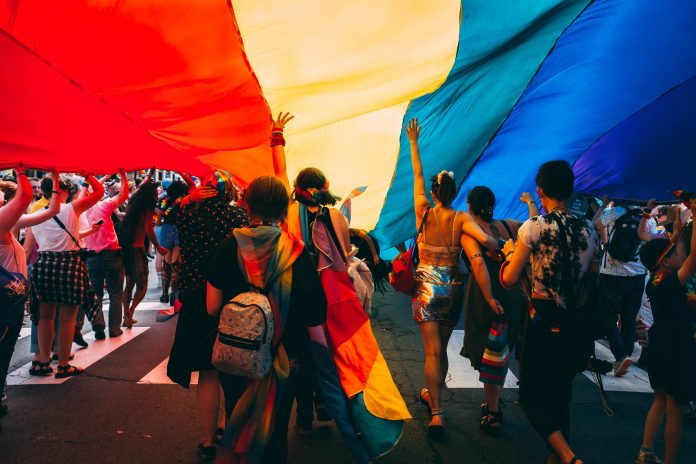Pride month is about celebrating the LGBTQ+ community and increasing discussions around equality. However, support from the community should not just be localised for that month, it should be consistent throughout the year. The FinTech market has often boasted itself as being at the forefront of change, but what is the sector like for the LGBTQ+ community?
Despite the strides that are being made for inclusivity in all workplaces, there is still a lot to be done. For example, a study from Glassdoor found that 53% of LGBTQ+ employees have experienced or witnessed anti-LGBTQ+ comments from co-workers. Worryingly, 47% of people in the community feel being outed could hinder their career.
Similarly, a report from The London Institute of Banking & Finance found that 40% of lesbian, gay and bisexual people have experienced conflict and harassment in the workplace. Risks are even higher for transgender employees, with 55% experiencing these aggressive situations. Threats are lower for heterosexual and cisgender colleagues, with 29% of this group encountering these attacks. These are just some of many stats that highlight the discrimination and violence experienced by the LGBTQ+ community.
A way to encourage change is making inclusivity messages clear. David Pedersen, senior director of Worldwide Communications at anti-fraud company Outseer and a member of the LGBTQIA+ community, said, “Diversity messaging and policies should not just be listed in job descriptions, but featured prominently. If you want to attract diverse applicants, you have to make sure your messaging regarding diversity is current and on your marquis.”
Jamie Love, CEO of marketing firm Monumental and director of marketing at Pride Edinburgh, explained that the financial industry has a good level of engagement with the LGBTQ+ community, highlighting that Pride Edinburgh has always counted on the support of all the major banks, who get involved from a HQ and branch level. In terms of a customer perspective, Love has seen good engagement on diversity recruitment platforms from finance players.
Having a simple sign of support for the LGBTQ+ community can be more powerful than you might think.
Love said, “I always remember Lloyd’s Bank’s ad with the same sex couple. This ad probably came out about five years ago, since seeing this I switched both my personal and business bank accounts to Lloyds. At the time no one was taking such bold steps so I really applauded their desire to engage with my community.”
With the LGBTQ+ community estimated to have a combined buying power of $3.7trn, it is a major group companies are missing.
Why is it important for inclusivity?
Shockingly, it is illegal to be gay in 71 jurisdictions around the world, with 11 jurisdictions imposing the death penalty for being LGBTQ+.
However, prejudices against the community are found in most countries. UK-based FinTech company Revolut launched a rainbow card to support the LGBTQ+ community. The card also enabled spare change to be donated to ILGA-Europe, a leading charity which campaigns for LGBTI human rights in Europe and Central Asia. It was met with praise by many, but some took to Twitter to attack the move. Some said they would cancel their cards and one even asked for a card for “straight people.”
To provide members of the LGBTQ+ community a more inclusive place, a handful of FinTech companies have launched with a focus on the community. US-based Daylight is a digital bank aimed at the community, with tailored financial products and services. For example, users can earn up to 10% cash back for spending at LGBTQ+ bars and allied businesses. It also gives insights into how LGBTQ+ friendly companies are that you shop at.
Similarly, in Brazil, Pride Bank is another digital bank aimed at the community. Pride Bank gives 5% of its income to the Instituto Pride to support charities that help LGBTQ+ people.
These companies can help members of the community become more involved with their finances. The Center for LGBTQ Economic Advancement & Research (CLEAR) conducted a report that found that despite LGBTQ+ people having higher educational attainment, they are more frequently underemployed, receive lesser compensation and are less able to save or buy assets. Its report found that gay men made 32% less than heterosexual men, lesbians earned 11% less than heterosexual women and bisexual women earned 30% less than heterosexual peers. Additionally, LGBPTQ+ people are 7% less likely to have a savings account, 5% less likely to have a 401(k) or retirement plan, and 12% less likely to have an individual retirement account. It also stated that this community was denied residential mortgages 73.1% more often.
Felizitas Lichtenberg, diversity and inclusion officer of global FinTech giant SumUp, said, “LGBTQ+ focused banks can help provide an example of how many of the inherent biases of the traditional finance sector can be challenged. Where traditional banks are failing to generate opportunities for members of the LGBTQ+ community, LGBTQ+ focused banks can instead focus on encouraging members of the community to enter the financial sector, highlighting the benefits of a diverse and inclusive workplace.”
Echoing this sentiment was Monumental’s Love, who said these types of companies can push the mainstream providers to reassess their positions and products and how to better engage the community.
One of the most important things these FinTech companies do is foster a safe environment. “These banks serve one key purpose to the community – they show that they are a safe space,” Love added. “Yes, we’ve come a long way, but I’d be lying if I said I feel 100% comfortable sharing my sexuality in settings like banking, insurance and medical. These banks allow the community to feel at ease about their wants and needs and can talk openly about their circumstances. For example, applying for a mortgage as a same-sex couple – I can imagine disclosing your relationship status is much easier to do in an environment that proudly welcomes that.”
Marie O’Riordan, global director of public relations PayTech company Nuapay, has first-hand experience of the negativity around the LGBT+ community.
“I’ve run businesses and worked internationally for sizable chunks of my career,” O’Riordan said. “As a result, I’ve experienced first-hand the negativity that members of the LGBT+ community can experience when attempting to access professional services in many countries – even down to being refused a table at top restaurants when negotiating with clients. Businesses that are close-minded will lose out, as those who are part of the LGBT+ community (and other diverse backgrounds) are customers that are crucial to overall business success.
“Furthermore, I feel it’s crucial for minorities (in my case, a double minority: LGBT+ and Neurodiverse), to have a safe space to avail of professional services, including FinTech.”
LGBTQ+ support shouldn’t just be for June
During Pride month, a lot of companies change Twitter icons to the Pride flag and talk of support. However, there is a risk of corporate virtue signalling. As soon as the month is over, the topic is pushed aside until next year.
Love said, “Be wary of queer washing, engage authentically and make LGBT an always-on thing. People aren’t just gay for June.”
Pride month should not just be about companies trying to look good and be perceived as supportive. Real change is needed, and companies can help people feel more included and safer in the workplace. A recent survey from Deloitte found that just 45% of LGBTQ+ employees share their sexual orientation with the majority of their colleagues, with 19% not open at all in their workplace.
Similarly, just 43% of those whose gender identity differs from that assigned at birth are open about their gender identities at work, with 17% not open about their gender identity at all. Companies can do more to make people feel more welcome. The survey revealed that 82% of LGBTQ+ employees believe that allyship helps them be out at work.
O’Riordan said, “Given my experiences of homophobia over the years, including being physically gay-bashed on several occasions and being physically assaulted in broad daylight just before joining EML in 2017, I’m cynical of corporate bandwagons in the wider world latching onto anything LGBT+-related with no substance.
“Diversity and inclusion policies and awareness make a real difference in an organisation and help everyone to feel accepted. It’s refreshing to be myself at work with no backlash. Culturally, the buy-in at all levels across the organisation is reassuring.”
Pedersen urged for companies to not just see Pride month as an annual celebration, but rather an important part of the calendar for tracking progress. The Deloitte report found that 42% of LGBTQ+ employees have experienced non-inclusive behaviours, with 32% experiencing these behaviours both in the office and working remotely. However, employees that do not experience non-inclusive behaviours are 30% more likely to stay in their role for five years.
Pedersen said, “Instead of being the main event, FinTechs should think of June as the start of Q1 for LGBTQIA+ initiatives. They should make it the month when the company’s executive team – including LGBTQIA+ support group members – reviews their approach to LGBTQIA+ inclusivity. This determines what’s working and what’s not working for LGBTQIA+ employees and helps to develop an agreed-upon action plan for the year ahead.”
Doing more for the community
A lot of companies are launching supportive initiatives. For example, Mastercard launched the ‘Your True Self is Priceless’ campaign, which spans across live New York City Pride events, a social media activation and into the virtual world through two immersive metaverse experiences in Decentraland and Meta’s Horizon Worlds. As part of the campaign, MasterCard has asked members of the LGBTQ+ community to write candid letters to their younger selves, with these being collected and used as a virtual exhibition.
However, Pedersen warned FinTech companies of self-praising themselves. “Instead of self-congratulations, organisations that think they’re doing a good job can always find ways to do better,” Pedersen added. “They shouldn’t settle, but make sure they are consistently and effectively addressing diversity. Not every policy or initiative will work, but employees will – most likely – show a positive response to a company consistently trying to get it right.”
There is always more that can be done. Pedersen explained there are a number of ways that FinTechs can help support the LGBTQ+ communities and remove prejudices in the workplace.
One recommendation is establishing an LGBTQIA+ support group that is open to both LGBTQIA+ identifying folks and non-LGBTQIA+ identifying allies. Additionally, companies should adopt inclusive language into non-discrimination clauses and as much internal and external material as they see fit.
Pedersen added, “FinTechs should be making sizeable donations to a LGBTQIA+ support group or charity. But they should be doing so all year round, not just in June, otherwise, it can come off as empty virtue signalling. However, FinTechs should conduct due diligence on any charity before donating. A good place to start is the Human Rights Campaign. They should be wary of large, well-known charities that can seem relatively innocuous but may have a history of homophobia.”
Some of the small FinTechs might not have the budget to make big donations, but there are other ways to bolster support. “Demonstrating acceptance is always free.”
Lichtenberg also offered some examples of how FinTech companies can become more inclusive places. One of these is overhauling the recruitment process. “This involves ensuring the use of gender-neutral language in job descriptions and advertisements, sharing pronouns at the beginning of the recruiting process and avoiding discriminatory interview questions.”
Another step is to make all employees feel comfortable, included and respected. Key to this is creating an environment where everyone feels heard and comfortable to share their opinions.
Shining beacons in LGBTQ+ support
As mentioned, there are some FinTech companies that are really boosting support for the LGBTQ+ community. One of those is SumUp, a global payments platform that recently reached an €8bn valuation.
Lichtenberg explained that SumUp often meets with staff to explore how a welcoming environment can be fostered. Other initiatives include adjusting its recruitment process and hosting company-wide town hall meetings.
“No company is perfect, and SumUp, like many other FinTechs, has a way to go in terms of diversity and inclusion,” Lichtenberg said. “However, with 18% of SumUp’s workforce identifying as LGBTQ+, SumUp remains wholly committed to creating an inclusive and welcoming working environment.”
Esteban Morilla, talent acquisition & people projects coordinator at SumUp, gave insight into his experiences as an LGBTQ+ member of the SumUp team. Morilla said that he has experienced racism and homophobia having worked in various international advertising agencies in Chile and Germany.
“SumUp changed my life, from day number one I was treated as an equal, as a human. This might sound strange for someone outside of the queer community, but being treated as a human in a work environment can sometimes be a privilege.
“Feeling respect, sense of belonging and most importantly freedom had a huge impact in my personal professional and personal life. What do I mean with freedom? No fear. It’s like a domino effect of positive changes, which was unleashed once I joined the company.”
Morilla explained how his biggest achievement had been taking a leap of faith in moving. While it could have ended badly, it resulted in him finding a welcoming home. “I always like to use the sentence from zero to hero’, I started my life in Berlin from scratch, jumped in a plane from Santiago de Chile to Germany, one way, no plan, no friends, no family and no money. Today I am reaping the results of facing my own fears, daring to be authentic and taking chances.
“After many years of rejection, I finally found a workplace that respects and even celebrates who I truly am.”
Another company that is supporting the LGBTQ+ community is Nuapay. The FinTech company offers secure and seamless payments powered by open banking. O’Riordan said, “Our ethos at the forefront of payments technology is to share your truth, be authentic, be transparent and proudly remain unafraid. When a company embraces the LGBT+ community, it will be more open to a spectrum of diversity, which will inevitably grow its business.”
This inclusivity spreads through to the wider EML Group, which treats every individual as an equal, O’Riordan said. The group respects all cultures, backgrounds, communities and minorities and gives them an equal status and career opportunity.
More diversity in teams
Greater diversity in teams will always make for more balanced decision-making and the ability to collate a variety of perspectives on a challenge or task.
O’Riordan said, “Firms should always be blind to differences of all kinds, including not shying away from hiring or promoting LGBT+ teammates.” One method that Nuapay uses is a regular internal diversity and inclusion survey that helps it appreciate the diversity of its teams and individuals. “It’s empowering to learn from our People and Culture research that teammates overwhelmingly agree they can be their authentic selves at work.”
Love outlined many ways companies can help increase their diversity. For example, fundraising for local charities, creating opportunities to engage and educate by tackling popular questions or misconceptions, and developing policies to support LGBTQ+ employees, particularly around surrogacy related leave and trans requirements.
“Another important part is representation, if there isn’t LGBT representation at board level what are you doing to change that?” Love added. “Ideas around this topic can be anything from mentorship to professional training or even engaging with recruiters who specialise in driving non-tokenistic diversity at all levels of the organisation.”
Companies should not only focus on hiring more people, but also making a better environment for the team. Lichtenberg explained that there are often cultural biases, such as “ingrained micro-aggressions can be “jokes” like saying “this is gay”.” These are often justified as being “humour”, but the perpetrators might misunderstand the effects these comments can have, Lichtenberg added.
“Despite frequently manifesting in the workplace, it is our upbringing that often shapes our perception of what is acceptable. Therefore, it is hugely important to engage in conversations at home with friends and family to ensure a culture of acceptance is being created outside the work environment.”
Copyright © 2022 FinTech Global











